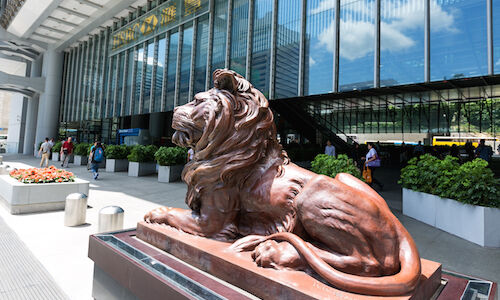Can HSBC Survive Hong Kong’s Fifth Regime Change?
HSBC’s establishment was built on regime change in Hong Kong following the Opium Wars and since then has successfully survived multiple geopolitical transitions. Will it survive the current one?
HSBC is facing perhaps the most critical inflection point in its 155-year history as it finds itself yet again sandwiched between two major world superpowers.
On one hand, it is attempting to please China, the market where it generates the majority of its income, most notably by acting as a vocal supporter of its policy decisions in Hong Kong. On the other hand, it is facing pressure to address its advocacy of legislation perceived to be an encroachment on Hong Kong’s freedoms while also being caught in the middle of an ongoing legal feud involving Huawei and its chief financial officer Meng Wanzhou.
Weakening profits (65 percent pre-tax profit plunge in the first half) and rapidly worsening U.S.-China relations are further ensuring that the bank increasingly cannot afford the buffer to always simultaneously appease both sides. But despite the challenges, HSBC is no stranger to regime shifts and its history boasts rich experiences in the operational effects of extreme geopolitical instability.
Old Hand: Fall of Qing
The former Hongkong [sic] and Shanghai Banking Corporation was established in freshly colonized British Hong Kong, following the Qing Dynasty’s losses in the Opium Wars in the 19th century, to finance trade in the region of various goods which infamously included opium.
Interestingly, HSBC was also vital in the formation of the Imperial Bank of China in 1897 – rebranded after the overthrow of Pu Yi, the country’s last emperor – which followed the British lender’s guidelines and even hired ex-executive Andrew Wright Maitland as its acting chief and signee of Chinese banknotes.
Old Hand: Fall of Japan
Just a few decades into post-dynastic China, HSBC faced yet another chapter of infamy in global geopolitics as Japan launched its military invasion of Manchuria in 1931 which eventually led to Hong Kong’s invasion in 1941. In anticipation, HSBC moved its head office back to London but its business in Hong Kong continued to face harsh conditions under Imperial Japan’s rule.
In addition to taking the bank's main office building in Hong Kong as its headquarter, the Japanese government had also coerced then chief manager Sir Vandeleur Grayburn into cooperation including the signing of banknotes and the assistance of Yokohama Specie Bank’s (post-war assets transferred to MUFG, formerly Bank of Tokyo) takeover of HSBC.
Despite cooperating in the open, Grayburn at the same time was secretly proving aid to military prisoners and bank employees. He was subsequently arrested and jailed before dying in Hong Kong’s Stanley Prison in 1943 at the age of 62. His successor David C. Edmondston also died while interned by the Japanese.
Same Same But Different
More than 70 years later, extreme geopolitical tensions are once again rocking the city and HSBC has, in fitting fashion, found itself wedged between two superpowers. Yet while there may be parallels between this inflection point and previous historical junctures, there are key differences that will make this chapter all the more challenging.
Firstly, HSBC is sandwiched in between two clear-cut superpowers compared to previous times when China was significantly weaker politically, economically and militarily.
Secondly, the turbulent environment exists in the backdrop of unprecedented connectivity via the internet, media and social media which have the potential power to quickly damage the bank, for example, by punishing its stock price or pulling out deposits. When executives today voice their views and opinions in an uncensored environment, they are vulnerable to public relations risks and even profit loss from a new age of increasingly conscious consumers.



























